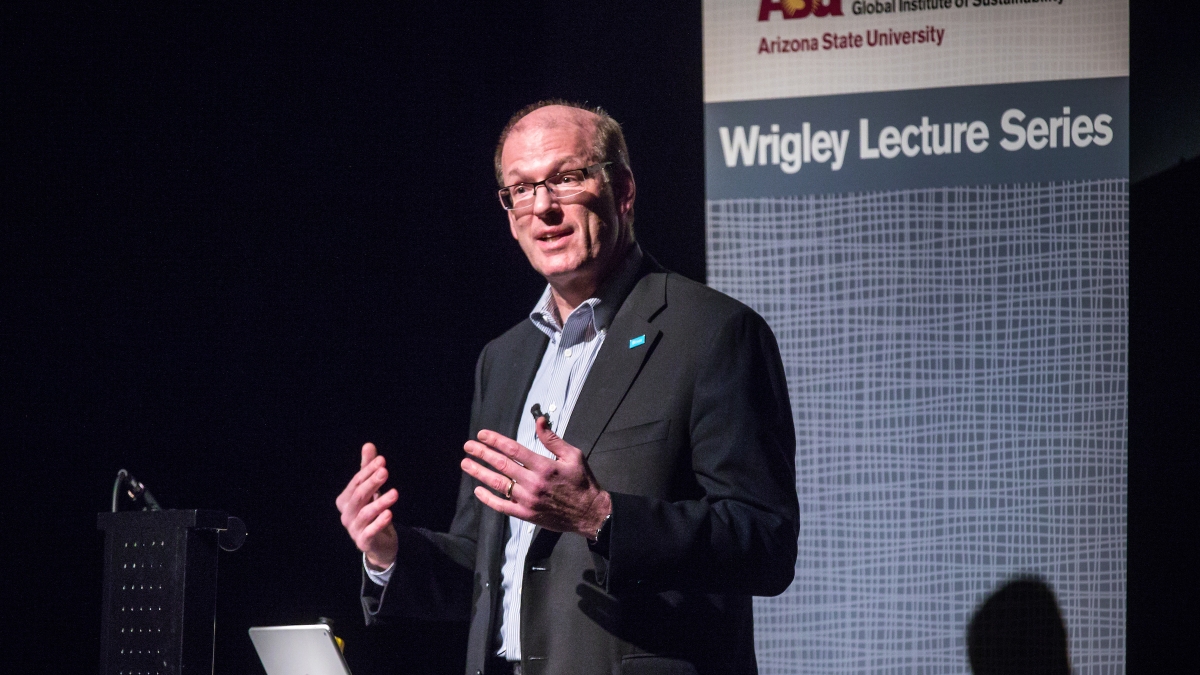There was a time when “green” housing was available only to the wealthy, but creating energy-efficient dwellings is key to improving the lives of low-income people, according to the CEO of Habitat for Humanity.
Jonathan Reckford, leader of the global nonprofit housing corporation, compared his organization’s goal to Arizona State University’s mission to widen access to higher education.
“It wasn’t that long ago that only rich people had ‘green’ houses. There was a sense that it was only available to people who had the resources to do it,” said Reckford, who spoke Tuesday at a talk sponsored by the Julie Ann Wrigley Global Institute of Sustainability at ASU.
“But our view was low-income families actually needed highly energy-efficient and healthy homes the most,” he said. “If you think (of) the cost of housing, including rent plus utilities, plus your cost of getting to work, we were seeing energy poverty in very hot and very cold climates,” he said.
So the organization partnered with the Home Depot Foundation to pay the cost difference between a basic Habitat house and a more energy-efficient home.
“We built about 5,000 highly energy-efficient homes, making us the largest ‘green’ homebuilder for most of the last decade,” he said.
“Most importantly, we measured over that time and proved that as the cost curve came down, that families were better off paying slightly more for their mortgage because their monthly cost of ownership went down with a more efficient home.”
Reckford said the Central Arizona Habitat for Humanity builds only Energy Star-certified homes that are fitted with low-flow plumbing features.
But the concept of sustainability must be broader, he said.
“Sadly, I hear stories every day of families struggling because we have a full-out affordable housing crisis,” he said, adding that there is virtually nowhere in the United States that a person working 40 hours a week at a minimum-wage job can afford a one-bedroom apartment.
He said that since the recession, incomes have declined and housing prices have increased to the point that it’s not sustainable — with California in particular crisis.
“Phoenix is right on the edge of being designated ‘severely unaffordable,’" he said.
That affects not just low-income families but service workers, firefighters, teachers and entry-level government workers who can’t live near their jobs and face long commutes.
“Today, this model where low-income families have to drive an hour each way to get to work is bad for the families, and it’s also bad environmentally and bad for the community because the roads get clogged up and the quality of life goes down.”
Globally, low-income people are being driven out to the edges of cities, often in slums or informal settlements. “With that we get a myriad of social ills,” he said.
Reckford said the largest demographic trend in the world is rapid urbanization and that cities are lacking in infrastructure to handle it. One of the most promising ideas combines mixed-income housing with transit development, he said, because it’s important to be near jobs. However, he said, transit improvements can drive up land values, pricing out affordable housing, so it’s important for cities to allocate housing beforehand.
Solving the housing crisis will require cooperation among the public and private sectors, plus universities and nonprofits, Reckford said.
“It’s not too late to address these challenges, but it’s urgent, because if we don’t make some of those choices now, in 10, 20 or 30 years, we’re going to have completely unsustainable and fully segregated cities that won’t work for anyone.”
Top photo: Jonathan Reckford, CEO of Habitat for Humanity, spoke at the Tempe Center for the Arts in a talk titled "Housing for Inclusive and Equitable Cities," sponsored by the Julie Ann Wrigley Global Institute of Sustainability at ASU. Photo by Charlie Leight/ASU Now
More Environment and sustainability

ASU President Michael Crow named to TIME100 Climate list
Arizona State University President Michael Crow has been named to the 2024 TIME100 Climate list of leaders and innovators driving real climate action.The list includes leaders across a range of…

Driving green desalination
Wilderness survival TV show hosts, pirates and water treatment researchers agree on one thing: Most natural water sources are not safe for drinking. Among the many potential risks is the high salt…

ASU preservation facility serves as test bed for rooftop heat mitigation
A roof coating that uses thermal energy storage materials from Arizona State University spinout EnKoat is halting the heat in several ASU buildings — including a section of the university’s largest…
